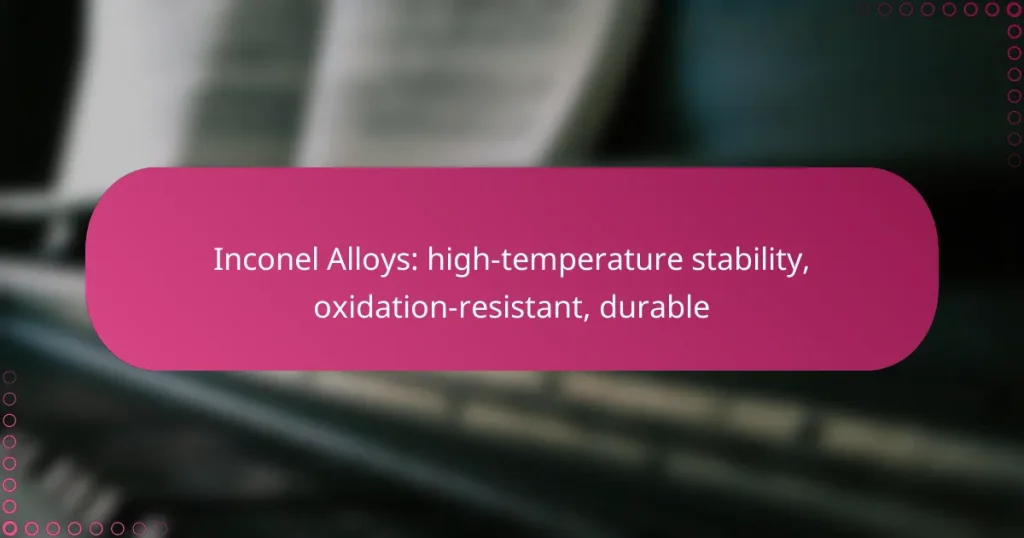Inconel alloys are renowned for their remarkable high-temperature stability, oxidation resistance, and durability, making them essential in industries facing extreme conditions. Their ability to form a protective oxide layer and their high chromium content contribute to their resilience, ensuring structural integrity in harsh environments. With exceptional mechanical properties, including high tensile strength and fatigue resistance, Inconel alloys are ideal for applications in aerospace, chemical processing, and power generation.

What are the best applications of Inconel alloys in high-temperature environments?
Inconel alloys are ideal for high-temperature applications due to their exceptional stability, oxidation resistance, and durability. These properties make them suitable for various industries, particularly where extreme conditions are prevalent.
Aerospace components
Inconel alloys are extensively used in aerospace components, including turbine blades, combustion chambers, and exhaust systems. Their ability to withstand high temperatures and resist oxidation ensures reliability and performance in flight conditions.
Manufacturers often choose Inconel for its strength-to-weight ratio, which is crucial in aerospace design. This allows for lighter components without sacrificing durability, contributing to overall fuel efficiency.
Gas turbine engines
Gas turbine engines benefit significantly from Inconel alloys, especially in parts exposed to high thermal and mechanical stresses. Components such as turbine rotors and stators are often made from Inconel due to its ability to maintain structural integrity at elevated temperatures.
When selecting Inconel for gas turbines, consider the specific alloy variant, as different compositions can offer varying levels of oxidation resistance and strength. This can impact engine efficiency and longevity.
Heat exchangers
Inconel alloys are commonly employed in heat exchangers, where they provide excellent resistance to corrosion and high temperatures. This makes them suitable for applications in chemical processing and power generation.
When designing heat exchangers with Inconel, it’s essential to account for thermal expansion and potential fouling. Proper maintenance and material selection can enhance performance and lifespan.
Industrial furnaces
Industrial furnaces often utilize Inconel alloys for their ability to withstand extreme heat and corrosive environments. These alloys are used in furnace linings, burners, and other critical components.
Choosing the right Inconel alloy for furnace applications can improve efficiency and reduce maintenance costs. Regular inspections and adherence to operational guidelines are recommended to maximize the lifespan of these components.
Marine engineering
Inconel alloys are advantageous in marine engineering, particularly for components exposed to seawater and high temperatures, such as exhaust systems and heat exchangers. Their corrosion resistance is crucial in preventing degradation in harsh marine environments.
When using Inconel in marine applications, consider the specific alloy’s resistance to pitting and crevice corrosion. Proper material selection can significantly enhance the durability and reliability of marine structures and equipment.

How do Inconel alloys resist oxidation at high temperatures?
Inconel alloys resist oxidation at high temperatures primarily through the formation of a protective oxide layer, high chromium content, and the presence of various alloying elements. These factors work together to enhance durability and maintain structural integrity in extreme environments.
Formation of protective oxide layer
The protective oxide layer is crucial for Inconel alloys as it forms when the material is exposed to high temperatures. This layer acts as a barrier, preventing further oxidation and protecting the underlying metal from corrosive elements. Once established, the oxide layer can self-heal if damaged, maintaining its protective properties over time.
For effective oxidation resistance, the oxide layer must be stable and adhere well to the alloy surface. Inconel alloys typically develop a chromium oxide layer, which is particularly effective at high temperatures, enhancing their longevity in harsh conditions.
High chromium content
High chromium content is a key feature of Inconel alloys that significantly contributes to their oxidation resistance. Chromium enhances the formation of the protective oxide layer, which is essential for preventing further degradation of the alloy. In many Inconel grades, chromium content can range from around 15% to over 30% depending on the specific formulation.
The presence of chromium not only improves oxidation resistance but also increases the overall strength of the alloy at elevated temperatures. This makes Inconel suitable for applications in industries such as aerospace and chemical processing, where high-temperature stability is critical.
Alloying elements
In addition to chromium, Inconel alloys contain various alloying elements that enhance their performance in high-temperature environments. Nickel is the primary component, providing excellent resistance to oxidation and corrosion, while elements like molybdenum and iron further improve mechanical properties and stability.
Other alloying elements, such as titanium and aluminum, can also contribute to the formation of protective oxides, enhancing the overall durability of the alloy. Understanding the specific composition of an Inconel alloy can help in selecting the right material for particular high-temperature applications, ensuring optimal performance and longevity.

What are the mechanical properties of Inconel alloys?
Inconel alloys are known for their exceptional mechanical properties, which include high tensile strength, excellent ductility, and fatigue resistance. These characteristics make them suitable for high-temperature and corrosive environments, often found in aerospace, chemical processing, and power generation applications.
High tensile strength
Inconel alloys exhibit high tensile strength, allowing them to withstand significant stress without deformation. This property is crucial in applications where materials are subjected to extreme temperatures and pressures, such as gas turbines and nuclear reactors. Typical tensile strength values can range from 700 to 1,200 MPa, depending on the specific alloy and treatment.
When selecting an Inconel alloy for a project, consider the operating conditions and required strength. Alloys like Inconel 625 and Inconel 718 are particularly noted for their high tensile strength, making them ideal choices for demanding applications.
Excellent ductility
Inconel alloys possess excellent ductility, which allows them to be easily formed and shaped without breaking. This property is essential for manufacturing complex components that require intricate designs. Ductility is typically measured by elongation percentages, which can exceed 30% in many Inconel grades.
When working with Inconel, ensure that the fabrication processes, such as welding or machining, are suited to maintain the alloy’s ductility. Proper heat treatment can further enhance ductility, making it easier to achieve desired shapes and sizes.
Fatigue resistance
Fatigue resistance is another critical mechanical property of Inconel alloys, enabling them to endure cyclic loading without failure. This is particularly important in applications like jet engines, where components experience repeated stress over time. Inconel alloys can maintain their integrity under such conditions, often outperforming other materials.
To maximize fatigue resistance, it is advisable to avoid sharp corners and stress concentrators in design. Regular inspections and maintenance can also help identify potential fatigue issues before they lead to failure, ensuring the longevity of components made from Inconel alloys.

What factors should be considered when selecting Inconel alloys?
When selecting Inconel alloys, key factors include the operating temperature range, corrosion resistance requirements, and mechanical load conditions. Understanding these elements ensures the chosen alloy performs optimally in its intended application.
Operating temperature range
The operating temperature range is crucial when selecting Inconel alloys, as these materials are designed to withstand extreme heat. Most Inconel alloys maintain their strength and stability at temperatures exceeding 1,000°F (540°C), making them suitable for high-temperature applications like gas turbines and nuclear reactors.
When evaluating temperature requirements, consider the specific environment in which the alloy will be used. For example, Inconel 600 is effective up to about 2,000°F (1,093°C), while Inconel 718 is often preferred for applications up to 1,300°F (704°C) due to its enhanced mechanical properties at elevated temperatures.
Corrosion resistance requirements
Corrosion resistance is another vital factor in selecting Inconel alloys, as these materials are often exposed to harsh environments. Inconel alloys are known for their ability to resist oxidation and corrosion, making them ideal for chemical processing and marine applications.
Different Inconel grades offer varying levels of corrosion resistance. For instance, Inconel 625 is particularly effective against pitting and crevice corrosion, while Inconel 600 provides good resistance to sulfuric and hydrochloric acids. Assess the specific corrosive agents present in your application to choose the most suitable alloy.
Mechanical load conditions
Mechanical load conditions significantly influence the selection of Inconel alloys, as these materials must withstand various stresses during operation. Factors such as tensile strength, fatigue resistance, and impact toughness should be evaluated based on the expected loads.
For high-stress applications, Inconel 718 is often favored due to its superior yield strength and fatigue resistance at elevated temperatures. In contrast, Inconel 600 may be more suitable for applications with lower mechanical demands. Always consider the specific load conditions and safety factors when making your selection.

How do Inconel alloys compare to other high-temperature materials?
Inconel alloys are known for their exceptional high-temperature stability, oxidation resistance, and durability, making them superior to many other materials in extreme environments. Their unique composition allows them to maintain mechanical properties and resist corrosion better than alternatives like titanium, stainless steel, and other nickel-based alloys.
Comparison with titanium alloys
Inconel alloys generally outperform titanium alloys in high-temperature applications due to their superior thermal stability. While titanium alloys are lighter and have excellent strength-to-weight ratios, they can lose strength at elevated temperatures, typically above 400°C. In contrast, Inconel maintains its mechanical integrity at temperatures exceeding 1000°C, making it more suitable for aerospace and industrial applications.
However, titanium alloys are often preferred in situations where weight is a critical factor, such as in aerospace components where reducing mass can enhance fuel efficiency. The choice between these materials often depends on specific application requirements, including temperature, weight, and corrosion resistance.
Comparison with stainless steel
Inconel alloys provide better oxidation resistance and high-temperature performance compared to stainless steel. While stainless steel can handle moderate temperatures well, it tends to oxidize and lose strength when exposed to extreme heat, typically above 800°C. Inconel, on the other hand, can withstand much higher temperatures without significant degradation.
Stainless steel is often more cost-effective and easier to work with for lower temperature applications. However, for environments involving high heat and corrosive conditions, Inconel is the preferred choice due to its durability and longevity.
Comparison with nickel-based alloys
Inconel is a type of nickel-based alloy, but it stands out due to its specific composition that enhances its high-temperature stability and oxidation resistance. Compared to other nickel-based alloys, Inconel typically offers improved performance in extreme environments, making it ideal for applications in gas turbines and chemical processing.
While other nickel-based alloys may be less expensive, they often do not match Inconel’s performance under high stress and temperature conditions. When selecting between these materials, consider the specific operational environment and the required mechanical properties to ensure optimal performance and longevity.

What are the different grades of Inconel alloys?
Inconel alloys are categorized into several grades, each designed for specific applications and environments. The most common grades include Inconel 600, 625, 718, and 825, each offering unique properties such as high-temperature stability and oxidation resistance.
Inconel 600
Inconel 600 is known for its excellent oxidation and corrosion resistance at elevated temperatures. It is often used in chemical processing and heat treating applications. This alloy can withstand temperatures up to approximately 1,150°C (2,100°F) and is particularly effective in environments containing sulfuric and hydrochloric acids.
Inconel 625
Inconel 625 is highly regarded for its superior strength and fatigue resistance, making it ideal for marine and aerospace applications. It performs well in extreme temperatures and is resistant to pitting and crevice corrosion. This alloy is often used in applications such as gas turbines and nuclear reactors.
Inconel 718
Inconel 718 is a precipitation-hardening alloy that provides high yield strength and excellent weldability. It is commonly used in the aerospace sector for components like turbine blades and rocket engines. This grade can operate effectively in temperatures ranging from -253°C to 700°C (-423°F to 1,292°F).
Inconel 825
Inconel 825 is designed for resistance to both oxidation and reducing environments, making it suitable for oil and gas applications. It offers good mechanical properties at room temperature and can withstand temperatures up to about 1,200°F (650°C). This alloy is often used in chemical processing and pollution control equipment.


